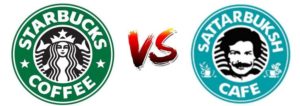In a David-versus-Goliath showdown that resonated far beyond Pakistan’s borders, a humble café in Karachi has made international headlines by triumphing over global coffee titan Starbucks in a high-stakes trademark dispute — a rare and symbolic victory for local enterprise against multinational corporate power.
The café, Sattar Buksh, opened its doors in 2013 and quickly became a cult favorite among Karachi’s youth and creatives, not just for its coffee and quirky menu, but for its bold, tongue-in-cheek branding. Its logo — a circular green emblem featuring a dapper, mustachioed gentleman with a mischievous glint in his eye — was immediately interpreted by many as a cheeky, culturally-rooted parody of Starbucks’ iconic twin-tailed siren. Far from attempting to deceive customers, Sattar Buksh leaned into satire, embracing its identity as a homegrown, irreverent counterpoint to the polished, globalized aesthetic of Western chains.
When Starbucks filed a legal challenge alleging trademark infringement and brand dilution, many expected the small café to fold under the weight of corporate legal machinery. But Sattar Buksh stood its ground. Its legal team mounted a spirited defense, arguing that “Sattar Buksh” was not a random imitation — it was a name steeped in local heritage, derived from a common South Asian surname and colloquial term. They emphasized that the brand’s entire ethos was built on humor, cultural commentary, and a celebration of Pakistani identity — not mimicry or malice.
The café further distinguished itself with a menu that defied convention and delighted patrons with its audacious creativity. Dishes like the “Besharam Burger” (a playful nod to shamelessness and indulgence) and the “LOC Pizza” (a tongue-in-cheek reference to the Line of Control between India and Pakistan) turned meals into cultural statements. Even its coffee names carried local flavor — puns, political jabs, and pop culture references that resonated deeply with its clientele.
After months of legal wrangling, the court delivered a landmark verdict in favor of Sattar Buksh. Judges ruled that there was no likelihood of consumer confusion, and more importantly, that the café’s branding constituted protected expression — satire and cultural commentary — rather than infringement. The decision was hailed not just as a legal win, but as a cultural milestone: a recognition that local voices, humor, and entrepreneurship deserve space to thrive — even in the shadow of global giants.
Across social media and news outlets worldwide, the case sparked conversations about intellectual property, cultural appropriation, and the rights of small businesses to creatively reinterpret global symbols. In Pakistan, Sattar Buksh became a symbol of national pride — proof that wit, authenticity, and community connection can stand up to corporate might.
Today, Sattar Buksh isn’t just a café — it’s a movement. A testament to the power of local storytelling, the resilience of independent businesses, and the idea that sometimes, the most potent form of resistance is a well-brewed cup of coffee… served with a side of satire.

Leave a Reply